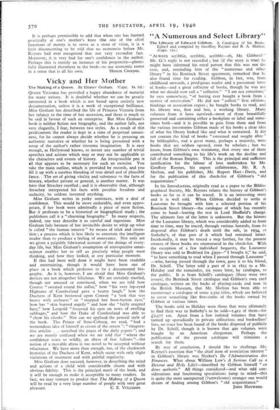ViCky and Her Mother
The Making of a Queen. By Eleanor Graham. (Cape. 8s. 6d.) QUEEN VICTORIA has provided a happy abundance of material for many writers. It is doubtful whether we can be greatly interested in a book which is not based upon entirely new documentation, unless it is a work of exceptional brilliance. Miss Graham has described the life of Princess Victoria from her infancy to the time of her accession, and there is much to be said in favour of such an enterprise. But Miss Graham's book is neither fiction nor biography, and the author falls, not very elegantly, I fear, between two styles. As a result of this predicament the reader is kept in a state of perpetual uneasi- ness, for he cannot always decide whether he is perusing an authentic narrative or whether he is being presented with a scrap of the author's rather tiresome imagination. It is easy enough, as Hollywood knows, to invent any number of trivial speeches and actions which may or may not be applicable to the characters and events of history. An irresponsible pen is all that appears to be necessary for such an exercise. You take the main outline; which is 'provided by records, and you fill it up with a careless blending of true detail and of plausible fancy... The art of giving vitality and substance to the facts of history, whether private or general, is another matter. It was here that Strachey excelled ; and it is observable that, although Strachey interpreted his facts with peculiar freedom and audacity, he seldom invented anything.
Miss Graham writes in perky sentences, with a deal of confidence. This would be more endurable, and even appro-. priate, if her book were admittedly a piece of mere fiction. But it professes to be a historical or biographical study ; the publishers call it a " charming biography." In many respects, indeed, one may describe it as careful and ingenious. Miss Graham fails because of her invincible desire to whip up what is called " the human interest " by means of trick and inven- tion ; a process which is less likely to entertain the intelligent reader than to produce a feeling of annoyance. Not only are we given a palpably fabricated account of the doings of every- day life, but Miss Graham's assumption of retrospective omni- science enables her to tell us precisely what people were thinking, and how they looked, at any particular moment.
If this had been well done it might have been readable and entertaining, though it would have been out of place in a book which professes to be a documented bio- graphy. As it is, however, I am afraid that Miss Graham's devices are not altogether felicitous. We are certainly startled, though not amused or convinced, when we are told how Conroy " sweated round his collar," how " his very lop-eyed Highness of Cumberland gave a hearty laugh." how the Duchess of Kent bestowed upon Conroy " a look that was heavy with archness " or " snapped her boot-button eyes," how her " skin burned angrily " and how she " fairly erupted fury," how Leopold " focussed his eyes on rows of swelling cabbages," and how the Duke of Cumberland was able to "chew his cheeks." Nor can we applaud the general style of the book. The Prince of Saxe-Coburg, we read, " had a tremendous idea of himself as cream of the cream "; " vitupera- tive articles . . . scorched the pages of the daily papers "; and we are merely confused when we are told that " where the confidence soars so wildly, an abyss of fear follows "—the notion of a movable abyss is too novel to be accepted without reluctance. We have more than enough, too, of the clockwork hysterics of the Duchess of Kent, which occur with only slight variations of treatment and with painful regularity.
Miss Graham does succeed, however, in describing the mind and actions of a child with considerable. charm and with obvious fidelity. This is the principal merit of the book, and it will be enough to make it acceptable to many readers. In fact, we may venture to predict that The Making of a Queen will be read by a very large number of people with very great










































 Previous page
Previous page